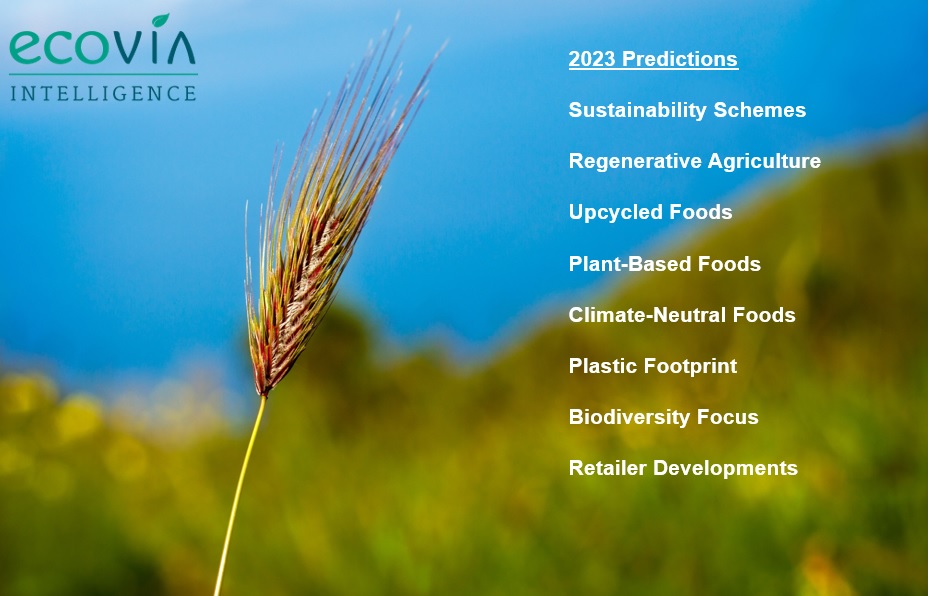Ecovia Intelligence gives its predictions for the year ahead. The previous year (2022) marked the recovery from the COVID-19 pandemic, as well as geopolitical conflict which has led to high energy costs and food inflation. Although the repercussions will continue to be felt in 2023, the outlook for sustainable foods remains positive…
> Sustainability schemes & certified land area. Adoption rates of sustainability schemes (organic, fair trade, RSPO, etc.) will continue to rise this year. The certified land area for 8 agricultural commodities has expanded ten-fold from 2.3 million hectares to 23 million hectares between 2008 and 2019, according to ITC & FiBL.
Organic leads with 75% share of all certified land. The amount of agricultural land certified according to sustainability schemes is expected to increase. Buoyant consumer demand for eco-labelled food products and ethical sourcing pledges by food companies will drive growth.
> Regenerative agriculture. More food operators are expected to make commitments to regenerative agriculture. General Mills, Nestlé and Unilever are some of the large food companies already investing in regenerative agriculture. More standards are expected to be introduced in the coming year. The Regenerative Organic Alliance is currently the frontrunner, adopted by over 100 farms that manage 0.23 million hectares of land area.
> Upcycled foods. Many new upcycled food and ingredients will be launched in 2023. Ecovia Intelligence research shows the number of companies with upcycled products has grown from almost nothing to over 200 in the last five years. Upcycled Foods Inc. (ReGrained), Barnana, Toast Ale and Crust Group are some of the pioneers of the upcycling movement.
Sustainability commitments and efficiency drives are encouraging food companies to develop upcycled products; expect to see more product innovations and new raw materials to be used as sources for upcycled foods this year.

> Plant-based foods. After many years of high growth, the dairy alternative and meat-free sectors are maturing. The highest growth is now projected in the plant-based seafood sector; expect to see new launches involving plant-based fish, calamari, shrimps, crab, etc.
> Climate neutral foods. Food production is one of the major contributors to – and most affected by – climate change. The climate change emergency is giving food companies fresh impetus to measure, reduce and offset their carbon emissions. This year, more food companies are expected to make climate-neutral pledges, with some adopting certification schemes of Climate Neutral, Carbon Trust, etc. Expect to see more brands make climate neutral / carbon neutral claims this year.
> Plastic footprint. As for carbon footprints, there is a trend to measure the plastic footprint of food and beverage products. Interest is growing in plastic neutral schemes like that of RePurpose Global and Plastic Credit Exchange whereby brands measure their plastic footprint and offset by removing plastic from the environment. Safe Catch and Pulp Pantry are some of the early adopters. Adoption rates are likely to rise in 2023.
> Biodiversity focus. At the recent UN Biodiversity conference, 195 countries made a commitment to protect 30% of land and water by 2030. Since the food industry is the largest contributor to biodiversity loss, expect to see more operators make biodiversity and deforestation-free pledges. Some are expected to follow EcoTone and incorporate biodiversity into its company ethos. Formerly known as Wessanen, the multinational food company changed its focus from organic to biodiverse foods in 2020.
> Retailer developments. The move to circularity is encouraging sustainable food retailers to adjust their business models. More organic & natural food shops are expected to offer refillable options: selling unpackaged foods, such as grains, cereals, nuts, seeds, lentils, rice, etc. Others are likely to follow EkoPlaza and develop plastic-free zones in their stores. Expect to see more refillables and plastic-free options in food retailers.
Sustainable Foods Summit
We showcase these developments at the Sustainable Foods Summit throughout the year. The North American edition is hosted in San Francisco, European edition in Amsterdam, Asia-Pacific edition in Singapore, and Latin American edition in São Paulo. More information is available from https://www.sustainablefoodssummit.com/
Posted: January 18th 2023
For permission to publish our research insights, please contact our media department

